#my econ of discrimination class was better but also like the only class i ever intensively studied for
Explore tagged Tumblr posts
Text
@ god why does my brain specifically and exclusively hate economics
#there is no other field/topic that i've ever tried to learn about that has produced the same like#white static brain sieve experience that econ does#i had to take so many econ classes in college!! and i got a's in all of them but it was through gritted teeth determination#and a deep willingness to do absolutely any extra credit possible#i rlly don't understand why its so hard for me#like it's basically sociology + math which are two things that DO make sense to me#but put them together and my brain goes 'AAAAAAAAAAAAAAAAAAAAAAAAAAAHHHHHHHHHHHHHHHHHHHH'#i still don't remember anything abt my international econ course from college. i think i dissociated thru the entire thing#it was in the same building as my fave campus art museum#and every day after class i would immediately go and just stand quietly in the museum staring at art#my econ of discrimination class was better but also like the only class i ever intensively studied for#and honestly i don't think i rlly remember anything from it#anyway. i was trying to read abt the malthusian trap and my brain gave up#so#perhaps its bed time#personal
8 notes
·
View notes
Photo
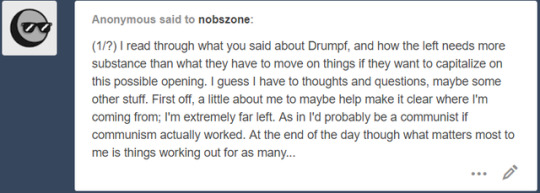
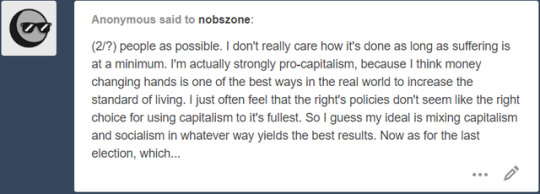
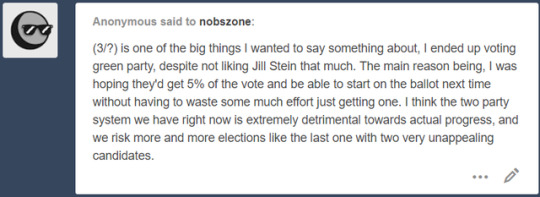
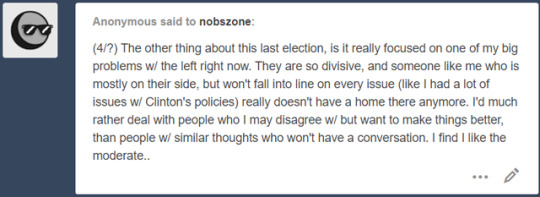

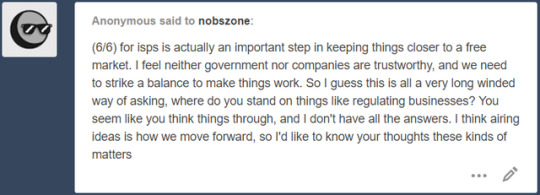
So I was checking my notifications to see which of my posts got the “ @takashi0bump” when I remembered I had this series of asks laying around in my inbox for the past month or so, and I figured now is a good time as any to go over them.
Before we get started, let me apologize to the anon for taking this long to answer. I’ve had a lot going on both on and off the site, and you asked quite a bit here. So I needed a while to get to a point where I felt I was able to properly answer your questions.
So, let’s begin.
First let’s talk about business regulation, and then I’ll give you some of my thoughts on the 2016 election, or at least thoughts that I haven’t had a chance to express yet (anyone who saw my long back-and-forth about a month ago knows I’ve already expressed quite a bit).
I consider myself a Capitalist for two reasons. First and foremost, I believe in an honest day’s work for an honest day’s pay. Secondly, as anyone who’s been following this blog will tell you, I’m a huge proponent of individual liberty.
Out of the three economic systems (Capitalism, Socialism, Communism), Capitalism is the one that gives individual people the best chance at achieving wealth and success for themselves. You look at famous American success stories like Steve Jobs, Bill Gates, Elon Musk, Nelson Rockefeller, Howard Hughes and so on. These are all stories that I don’t believe could’ve happened in a Socialist or Communist system.
But I also acknowledge the system isn’t perfect. It has its flaws and failings, some of which have been pointed out in great detail over the course of the last decade. I also am willing to concede that because of the increasing automation of the labor force as well as the development of technology such as AI, Capitalism itself may no longer be viable in as little as 20-30 years.
Because when your workforce is composed of robots, what do you pay them?
Anyway, that’s for another discourse. My point is that while I don’t think Capitalism is the be all end all perfect system for mankind, it’s the best one that we have under the current circumstances as it allows for the most individual freedom as well as gives individual citizens the best chance to achieve wealth and success.
So with that in mind let’s talk about where I stand on regulation.
I’m...mostly against the government interfering with the private sector, but I’m completely open to certain types of regulation.
For example:
Environmental, to ensure that business activities don’t result in serious pollution and/or environmental catastrophe.
Fair labor rules to enforce my above stated belief in an “honest days work for an honest days pay” (though I will freely admit I’m more in favor of right-to-work laws than unions).
Anti-trust regulations to break up monopolies and keep competition alive.
Net Neutrality to ensure the internet remains free and open (Have you all called or emailed your representatives and/or senators, by the way?)
Safeguards to ensure that people buying property or taking out a loan can actually afford to buy said property or pay back said loan (this is mainly to try and prevent a repeat of 2008).
So, some oversight, but not necessarily to the extent that you’d see in a non-Capitalistic system.
I know it’s popular for folks in my generation to rail on about the “evils of Capitalism” (while typing their rants using technology made possible by Capitalism), but there’s certain areas where I think the private sector is much better suited to excel than any government program would ever be.
One example is healthcare.
Let me say up front that I don’t disagree with the idea of a universal high quality healthcare system. Hell I don’t even disagree with the idea of free healthcare for everyone. I think that giving everyone access to high quality healthcare at an affordable price is a goal we should be working towards.
But my issue with acts like the ACA and other systems like the NHS in England is the economics of it.
At the end of the day, a healthcare system that is of high quality, universal and comprehensive while still being affordable is an economic impossibility.
Basically think of the healthcare market as being like a supply and demand curve that you learned about in your Econ class. The “supply” in this case is the number of doctors available, the quality of the care, etc. The “demand” of course is the people needing healthcare. The equilibrium point is where the two meet.
What the ACA and the NHS try to do is set what basically amounts to a price ceiling. They’re saying “okay, health care of <x> quality will not cost any more than <y> dollars.” Which sounds nice for everyone. More people get access to higher quality care, doctors still get paid, everything is peachy.
Problem is, for said price ceiling to be effective, it has to be set below the equilibrium price. So now there’s a gap between the supply and demand lines: a shortage.
In this case a shortage could mean anything from lack of available doctors, a decline in the quality of the care given, waiting times for surgery, things like that.
And if that’s a trade-off you’re willing to make, more power to you. For me? I think it’s counter-productive.
So with that in mind, here’s my radical idea for helping expand healthcare coverage:
Let insurance companies compete across state lines.
Right now, it is illegal to buy health insurance out-of-state. I think lifting this little restriction will do wonders in helping to alleviate the healthcare crisis in America.
While I can’t be certain, I think that private healthcare could indeed become a perfectly competitive market, with all insurers falling towards an equilibrium price. If someone in one state is charging an astronomical amount for coverage, and someone in another state is offering the same coverage for half the cost, people in the first state should be able to buy from the second state.
In a related story, this would also help people in the LGBT+ community. If you live in a state that denies you coverage because you are a non-heteronormative citizen, you should be able to buy from a state that does not discriminate.
Now I don’t know if this would actually work out, the economics of this can be figured out by people much smarter than I am. But I do feel this is an instance where the private sector can do a better job than the government.
Another area I feel the private sector succeeds is in technological development.
Apple and Microsoft come to mind, but the example I like to use the most is SpaceX.
I want you all to repeat this to yourself once a day for the foreseeable future: Elon Musk is taking us to Mars.
SpaceX has only been operating for 15 years, and already they have technology that only made it to the drawing board for NASA. In a year they may be ready to send manned missions into Space, while NASA’s own spacecraft is still at least 2 years, possibly 3, from its first manned flight. And a lot of this is because SpaceX doesn’t have to answer to any bureaucrats in DC. They’re free to use their budget however they wish, while NASA is only given a sliver of the federal budget, and has to justify every dollar they spend.
In a related story, I’m cautiously optimistic about Trump’s plans for NASA. While it seems he has a very basic understanding of how spaceflight actually works, he does seem to have a legitimate interest in manned spaceflight, which is more than I can say for the last administration.
But I digress.
So I hope that clarifies my position on the free market.
Anyway, now I’d like to talk briefly about some trends I’ve noticed on the left and the right in the wake of the election. Since this post has gone on for quite a bit already, I’ll try to keep this part relatively short.
I find myself in a unique position, where for the first time in my life I am legitimately annoyed by both political parties.
The GOP seems to have looked at how the Democrats all but ceased to exist in 1968 and said to themselves “Lets do that.” They’ve made token statements of annoyance at Trump’s antics, but aren’t willing to do what it takes to reign him in. Sadly, I predicted this would happen, as the GOP is mainly trying to tread water until they get through the midterms next year. Sadly this has allowed for some more...fanatical members to make some noise on the federal and state level, people who basically want to say or do anything and they don’t care who they offend in the process.
Meanwhile the Democrats are a total mess right now. As I’ve said before, I cannot believe they actually rejected Socialism before the Republicans got a chance to do so. But that “Feel the Bern” faction that got...well...burned in the 2016 primaries is still angry and vengeful. You have people like Michael Moore calling for all the neoliberal Democrats to be ousted, and to make the Democrats a true Socialist party. At the end of the day, the only thing the Democrats even have to say to the American people right now in regards to why they should vote for them in 2018 is “We’re not the GOP.”
So yeah, you can see why I’m willing to take potshots at both the left and the right at this point in time (much to the imagined horror of high-school age me who was a raging neocon who absolutely would have voted for Donald Trump if he had the chance, but that’s another story).
But here’s something really interesting I’ve noticed.
As the anon in the ask said, there’s a lot of people on the left who feel that they aren’t welcome there anymore, even though the left is the side that, in theory, should be supporting of them. And a lot of this has to do with the fact that there’s this major “our way or the highway” attitude right now with the liberal elite. And you’ve all heard me express my annoyance with the left’s tendency as of late to (as Tom Walker’s Johnathan Pie character so expertly put it) “believe in diversity as long as it’s not diversity of opinion.”
For better or worse, I haven’t seen that on the right.
I mean, there’s been a couple prominent examples of former Republicans saying they can no longer associate with the GOP. Joe Scarborough being the most recent example (though, honestly, who could blame him?), but the fact is that there’s still a lot of differing ideas and philosophies in play right now for the GOP.
Paul Ryan is a big fan of Ayn Rand and her philosophy of Objectivism, he also supported the auto industry bailouts of 2008 and the Dodd-Frank act.
Rand Paul is a Libertarian (when he feels like calling himself one) who wishes to ban abortion entirely, and while he is not an advocate for decriminalizing marijuana, he is against mandatory minimum sentencing for drug crimes.
John McCain has come out against universal healthcare (also favoring a free-market solution) and Net Neutrality, but he’s also been one of the most vocal proponents of Native American issues as well as one of the most hawkish voices on the right in regards to Russia.
Donald Trump...well...nobody really knows what he supports, as his statements on his political views can range from inconsistent to downright incoherent, but he has consistently supported medical marijuana, term limits for Congress, and manned exploration of space.
Reminder that the Log Cabin Republicans also exist.
The point is there’s a lot of room on the right for differing viewpoints. And I’ve found that even if people can’t completely agree with the GOP on everything, they still don’t have an issue at least relating to them. I personally don’t see eye-to-eye with the Republicans on everything, but I have no problem voting for them, or describing myself as being conservative on certain issues.
And, most importantly, at no point have I ever felt alienated from my more hardcore GOP friends because my beliefs didn’t align with the party.
So, all things considered, it seems that when it comes to diversity of opinion, the Republicans are doing a better job. Why is that? Well I think it’s because both parties, at their core, have a very different philosophical approach to how they wish the United States to be. Though to be clear, this doesn’t just apply to the US of A, this applies to the left vs right debate pretty much everywhere.
The left’s political philosophies (starting at moderate Liberalism and going all the way to Collectivism) put more emphasis on what’s best for the group. The old “the needs of the many outweigh the needs of the few” cliche. The left’s approach to a problem is to basically say “okay we’re going to try one solution and one solution only, but it’s going to be the solution that benefits everyone in some way.”
In a related story, this is why I think a lot of millennials are gravitating towards the left. Thanks to the Internet, we are the first generation in the history of humanity to have actually been part of a truly global community. And it’s not just in politics where this group mentality comes into play. Hell half the time there’s fandom drama, it’s because someone said something stupid and everyone else decided to get together to prove how wrong they were.
It’s important to realize that our parents and grandparents didn’t have this kind of global community. In fact, for about half a century, they were taught to fear the other, the foreigner, the people with the incompatible lifestyle who were out to destroy you.
This is why I think they gravitated towards the right, because the right (starting at moderate Conservatism and going all the way to Objectivism) focuses more on what’s best for the individual. Whether it’s success in the free market, the right to own a firearm, the right to pick your healthcare provider, etc. The right is more focused on individual liberty. Their approach to a problem is to basically say “okay, everyone try the solution that they feel works best for them.” So that’s what I think it comes down to. And both mindsets have their pros and cons.
The left would restrict individual liberty, but they would also aim to make a world where everyone is treated fairly and has the same quality of life.
The right may not care about those social protections and some people would be better off than others, but they would also aim to make a world that had unlimited freedom and choice.
And this is the important part. Do yourself a favor and write it down on your desktop or something so you can see it every single day. Because in times like these, this cannot be stressed enough:
Neither the right nor the left are inherently evil. They BOTH have villains: the extremists who want to do EVERYTHING one way.
Whether it’s the alt-right or the cntrl-left, those camps just want to stick to their way and their way only. The truth of the matter is that just going one way gets us nowhere, and as much as people in both of those camps like to mock centrists, the answer really does lie somewhere in the middle.
I like to think of America as like a car driving down a road. For the most part, we try to stay in the center. But every so often the road turns or shifts, and we have to adjust to the left or the right to stay where we need. But we should never ever make a hard left or hard right, that would end in disaster.
Alright, so that’s the end of this wall of text. If the original anon is reading this, I again apologize for taking so long and I hope I was able to give you satisfactory answers to at least some of your questions. As for the rest of you, I hope you at least learned a little bit more about how I view the world we live in. If you yourself have any questions about my views on all this, feel free to ask!
26 notes
·
View notes